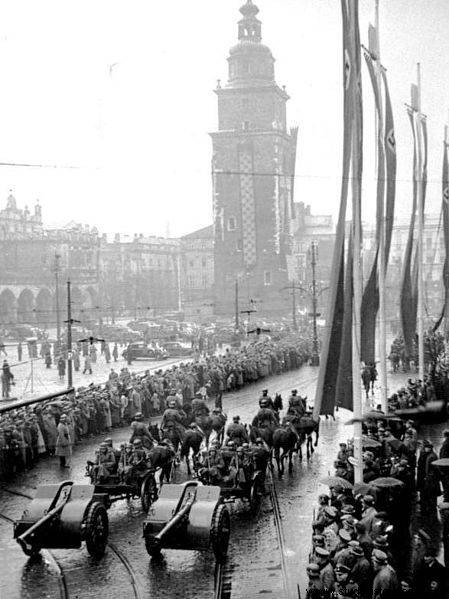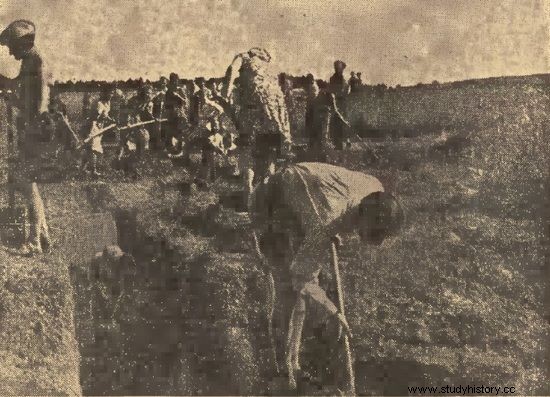Fights in the Main Market Square in Krakow, collapsing towers of St. Mary's Church and the Barbican hit from Nebelwerfer? Wawel demolished by the Germans to punish Poles for starting an uprising? This could all have happened.
The first uprising in Krakow was planned for the spring of 1940. It was supposed to support the march of the Allied troops to Berlin, which, of course, did not take place at all. For the second time in 1943, when Krakow was included in the "Tempest" plan - it was supposed to explode when the city was near the frontline.
In 1944, the plans were specified - the main targets of the attacks were indicated, which numbered around 70, incl. Kościuszko Mound, the airport in Rakowice-Czyżyny, the Żaczek student house where SS soldiers were stationed, government buildings of the General Government and the railway station. In July, the Kraków Home Army soldiers were put on alert, and then “vigilant until the uprising”.
At the time, it might have seemed that the end of the war was imminent. In July in Krakow, an unsuccessful attempt on the SS and police commander, Wilhelm Koppe, reached the news of the attempted attack on Adolf Hitler, anyone who had an atlas could, even by reading only the occupying press, see how impressive the progress of the Red Army was.

Krakow under German occupation
Within 6 weeks, the Russians moved the front 640 km west. Free areas controlled by the Underground began to emerge between the retreating Germans and the advancing Russians, including The Kazimierz-Proszowice Partisan Republic north-east of Krakow.
Mobilization of the Home Army in Krakow
On August 2, the Red Army troops captured Rzeszów. On that day, the first information about the uprising in Warsaw reached Krakow. There was a certain excitement in town, especially among the youth. Some started looking for contact with the Underworld.
Major Ryszard Nuszkiewicz ps. "Slow" recalled:
Almost the day after the mobilization was announced, soldiers from the former diversionary districts and volunteers, mainly from Krakow, started arriving. They carried incredible enthusiasm, will to fight and, unfortunately, few weapons.
The "Kraków" District of the Home Army numbered approx. 90 thousand. soldiers, but 2/3 of them operated in the Rzeszów Sub-District. A total of several - several thousand conspirators could therefore participate in the uprising in Krakow, but only 10-15 percent. of them had weapons, if we also included bottles with gasoline.
Fortunately, the decision about a possible revolt was to be made by the military and politicians, and they judged the matter rationally. In July, the commander-in-chief, Gen. Kazimierz Sosnkowski, ordered caution in the organization of the insurgent activities in order to: not attract the population to a poorly calculated general uprising .

The article was inspired by Mirosława Kareta's novel "Bezimienni" (WAM Publishing House 2016).
Anti-insurrection command
The decision-makers knew that the Russians were almost 200 km from Krakow, their own forces were a few times weaker than the Germans, not to mention firepower. The idea of organizing a war in Krakow was clearly opposed by all the leading politicians active in the local underground, supported by the Krakow Curia.
The commander of the Kraków District of the Home Army, Colonel Edward Godlewski, pseudonym "Garda" and probably with relief accepted the later decision of General Tadeusz Komorowski pseud. "Bór", which ordered to send troops to help fighting Warsaw, and not to organize new uprisings.
The Germans did not intend to display white flags. In the German district and at the offices, bunkers were built, windows on the ground floor and in the basement were bricked up, leaving arrowslits in them, passages between buildings were pierced, concrete anti-tank barriers were erected at important intersections. Patrols and controls on the streets were intensified, many Germans were barred in offices and institutions, new troops were brought to the city.
When, with the outbreak of the uprising in Warsaw, the Red Army slowed down the offensive, the Germans regained their vigor. On Saturday, August 5, with the support of aviation, they began to liquidate the Partisan Republic. A day later, they conducted the largest round-up in the history of occupied Krakow, in which approx. 6-8 thousand people were arrested. men.
This sunny Sunday received its nickname "black" in the afternoon, when numerous German troops started catching people on the streets, in trams, relaxing in Błonia or the Vistula, or even taking the unlucky ones directly from their apartments.
The Nazis did not ask for documents, they did not even want to see them, so even passes or certificates confirming that their holders worked in plants important for the war needs of the Third Reich did not help. They were all transported to the concentration camp in Płaszów.
A wide-ranging action smashed some of the Underground structures, intimidated Krakow and paralyzed the city's life. On that day, for example, bakers, postmen, policemen, railroad workers and tram drivers did not turn up for work. The next year, various companies and factories, offices and offices ceased to function, deprived of some of their employees.
Only the interventions of the employers and the gradual release of those arrested improved the situation. Not everyone regained their freedom - the Germans discovered many conspirators on the occasion of this mega-adventure and prevented any uprising in Krakow from breaking out.

Women from Kraków working on the construction of German fortifications. Photo published in "Goniec Krakowski" from August 15, 1944 (source:public domain).
Cracovians are digging ditches for the Germans
In order to pacify the city to the end, the Germans called on the inhabitants of Krakow to dig trenches. Many volunteers volunteered for this work. This eagerness to work for the Thousand-Year Reich was not at all an expression of collaboration. Going outside the city gave the opportunity to buy and bring food from the countryside, as well as receive cigarettes, alcohol or food stamps from the Germans. The Krakus simply acted in their own interest.
As long as the supplies were distributed, there was considerable interest in preparing the Reich to defend itself against Bolshevism. Later, when there were no "gratuities", the Germans had to resort to threats to mobilize the diggers. However, the combat value of the field fortifications was assessed by the Cracovians only for an hour and 5 minutes - this is how much they believed they could stop the Red Army. At the sight of the fortifications, the Russians were supposed to laugh for an hour and cross them in 5 minutes.
In the background of this relatively mild pacification of Krakow, the drama of Warsaw continued. The underground press reported further damage and losses among civilians. At night, heavy, four-engine Allied planes flew over Krakow or its vicinity, heading for Warsaw or the surrounding area to deliver weapons and means of combat there.
 Polish "Allo-allo"?
Polish "Allo-allo"?
On the night of August 17, 1944, one of them, the B-24 Liberator bomber of 178th RAF Squadron, was damaged by a German night fighter. Over Krakow, the flying machine caught the lights of anti-aircraft searchlights, showing the target to the crews of the guns. The plane they shot, burning like a comet, crashed right next to the factory managed by Oskar Schindler. It is the story of Liberator, which crashed in Krakow's Zabłocie, that forms the basis of Mirosława Kareta's novel The "Faceless."
Only one crew member survived, who jumped out of the damaged machine before Krakow and was taken into the care of partisans. That night alone, the Allies lost 5 other machines in airdrop operations - a total of 33 airmen died, 3 went missing without a trace, 1 was captured, and 8 were saved by Polish partisans.
In September, on the order of General Bor, units of the Home Army moved from different parts of the country to help the fighting Warsaw. The Krakow rescue, however, did not come far - on September 11, 1944, near the village of Złoty Potok near Częstochowa, the "Skała" battalion from the Krakow Home Army was attacked by 5 times stronger German troops. Poles, who suffered heavy losses there, had to order a retreat.
The Germans wanted to provoke an uprising in Krakow
Meanwhile, in Krakow itself, the Germans began to devise plans to provoke the Polish uprising. It would probably last a short time, and after its suppression, a large part of Krakow's inhabitants could be transported as slave labor to the Reich. Rumors and rumors were opposed by the underground press:

B-24 Liberator bomber
In constant fear of an uprising in Poland, the Germans resort to new provocations. The cowardly Gestapo, wanting to justify the necessity of its existence away from the front, has already informed its authorities about the allegedly planned uprising in Krakow on October 10 and has already prepared a plan for new acts of terror and rape .
The example of Warsaw and the appeals of the Underground, however, prevented the inhabitants of Krakow from catching on to a provocation and an insurgent uprising. And although the occupation continued, and repressions with it, the city and its inhabitants were not annihilated as in Warsaw.
